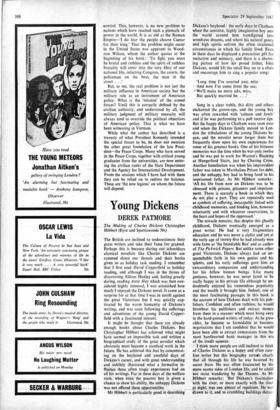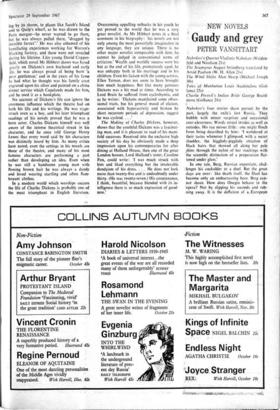Young Dickens
DEREK PATMORE
The Making of Charles Dickens Christopher Hibbert (Eyre and Spottiswoode 50s) The British are inclined to underestimate their great writers and take their fame for granted. Perhaps this is because during our schooldays classical novelists like Charles Dickens are rammed down our throats and their books given us as holiday task reading. I remember that I first read David Copperfield as holiday reading, and although I was in the throes of discovering Aldous Huxley and, feeling greatly daring, reading Antic Hay which was then con- sidered highly immoral, I was astonished how much I enjoyed the Dickens novel. It came as a surprise for at that time I was in revolt against the great Victorians but I was quickly cap- tivated by the warm humanity of Dickens's writing, and was soon following the sufferings and adventures of the young David Copper- field with a fascinated interest.
It might be thought that there are already enough books about Charles Dickens. But Christopher Hibbert has achieved what might have seemed an impossible task and written a biographical study of the great novelist which obviously must become a standard work in the future. He has achieved this feat by concentrat- ing on the boyhood and youthful days of Dickens's career, and with great understanding and subtlety illustrated what a formative in- fluence these .often tragic experiences had on all his writings. For in these days of the welfare state, when even the poorest boy is given a chance to show his ability, the unhappy Dickens was not offered these opportunities.
Mr Hibbert is particularly good in describing Dickens's boyhood : the early days in Chatham whe' the sensitive, highly imaginative boy sees the world around him transfigured into wondrous dreams, and where his natural gaiety and high spirits enliven the often straitened circumstances in which his family lived. Even in these days he displayed a precocious gift for recitation and mimicry, and there is a charm- ing picture of how his proud father, John Dickens, would lift the small boy on to a chair and encourage him to sing a popular song:
'Long time I've courted you, miss And now I've come from the sea; f We'll make no more ado, miss, But quickly married be. . .
Sung in a clear treble, this ditty and others enchanted the grown-ups, and the young boy was often rewarded with 'salmon and fowls' and if he was performing in a pub receive tips. But the happy days in Chatham were soon over and when the Dickens family moved to Lon- don the tribulations of the young Dickens be- gan, and the novelist never forgot them but frequently drew upon his own experiences for some of his greatest books. One of his bitterest memories was the time when he was only twelve and he was put to work for Warren's Blacking at Hungerford Stairs, just by Charing Cross. Another humiliation was when his improvident father was taken to Marshalsea Prison for debt, and the unhappy boy had to bring food to his imprisoned father. As Mr Hibbert remarks: 'All his life from now on Dickens- was to be obsessed with prisons, prisoners and imprison- ment. There is scarcely a book in which they do not play a part. They are repeatedly used as symbols of suffering, inescapably linked with childhood memories, and binding him, however reluctantly and with whatever reservations, to the fears and hopes of the oppressed.'
The miracle remains, that despite this ghastly childhood, Dickens eventually emerged as a great writer. He had a very fragmentary education and he was never a stylist and yet at the early age of twenty-five he had already won wide fame as 'the Inimitable Boz' and as author of The Pickwick Papers. But unlike some other great Victorians, Dickens always had an un- quenchable faith in his own genius and his talents, and his early sufferings gave him an extraordinary compassion and understanding for his fellow human beings. Like many geniuses, however, he was never fated to be really happy in his private life although he un- doubtedly enjoyed his tremendous popularity and the wealth it brought him. Indeed, one of the most fascinating passages in this book is the account of how Dickens dealt with his pub- lishers. Confident and often ruthless, he would browbeat his publishers and extract money from them in a manner which must bring envy to the hard-pressed writers of today. As he grew older, he became so formidable in business negotiations that I am confident that he would have been able to extract concessions from the most hardhearted bank manager in this era of the credit squeeze.
I think many people are still inclined to think of Charles Dickens as a happy and often care- free writer but this biography reveals clearly that all through his life he was haunted by secret fears. He was often fascinated by the more seamy sides of London life, and he could not resist wandering by the Thames. As Mr Hibbert remarks: 'But Dickens's fascination with the river, or more exactly with the river at night, was one almost of repulsion. He was drawn to it, and to crumbling buildings decay-
jeg by its shores, to places like Jacob's Island and to Quilp's wharf, as he was drawn to the Paris morgue—he never wanted to go there, but be was always pulled there, "dragged by invisible forces".' He was also ashamed of his humiliating experiences working for Warren's Blacking factory, and these were not revealed during his lifetime. Like young David Copper- field, which novel Mr Hibbert shows was based greatly on Dickens's own boyhood and early life, he was always proud of being born 'a poor gentleman,' and in the years of his fame he had what he thought was his family crest engraved upon his sibier and painted on a china dinner service which Copelands made for him, and he used it as a bookplate.
No account of Dickens's life can ignore the enormous influence which the theatre had on both his life and his writings. He was stage- struck even as a boy, and his later triumphant -readings of his novels proved that he was a born actor. Charles Dickens himself was well aware of the intense theatrical streak in his character, and he once told George Henry Lewes that every word said by his characters was distinctly heard by him. As many critics have noted, even the settings in his novels are those of the theatre, and many of his most famous characters are performing a' part rather than developing an idea. Even when he was still a handsome young man with flowing brown hair he was always a dandy and loved wearing startling and often flam- boyant clothes.
In a modern world which worships success the life of Charles Dickens is probably one of the most triumphant in English literature. Overcoming appalling setbacks in his youth he yet proved to the world that he was a very great novelist. As Mr Hibbert notes in a final comment in his biography: 'his novels are not only among the most powerfully imaginative in any language, they are unique. There is no other major novelist comparable with him; he cannot be judged in conventional terms of criticism.' Wealth and worldly success were his but at the end of his life, prematurely aged, he was unhappy both in his marriage and in his children. Even his liaison with the young actress, Ellen Ternan, does not seem to have brought him much happiness. But like many geniuses Dickens was a bit mad at times. According to Lord Brain he suffered from cyclothymia, and as he writes: 'Dickens manifested some obses- sional traits, but his general mood of elation, associated with hyperactivity and broken by short recurrent periods of depression, suggest he was cycloid... .'
The Making of Charles Dickens, however, shows that the youthful Dickens was a fascinat- ing man, and it is pleasant to read of his mani- fold successes. Received into the exclusive high society of his day he obviously made a deep impression upon his contemporaries for after dining at Holland House, then one of the great London houses, Lord Holland's sister, Caroline Fox, could write: 'I was much struck with him and liked everything but the intolerable dandyism of his dress. . . . He does not look more than twenty-five and is undoubtedly under thirty. (He was twenty-seven.) His countenance, I think, beautiful, because blended with its in- telligence there is so much expression of good- ness.'.







































 Previous page
Previous page